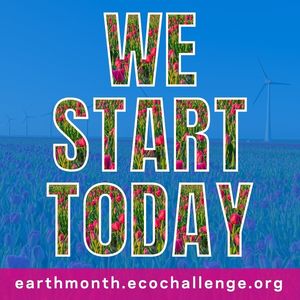-
 Darcy Hoag 4/28/2024 10:54 AM
Darcy Hoag 4/28/2024 10:54 AM -
 Marylene Pascua 4/28/2024 9:55 AM
Marylene Pascua 4/28/2024 9:55 AM
Tijana Bunjevacki
"Making every day count!"
POINTS TOTAL
- 0 TODAY
- 0 THIS WEEK
- 1,425 TOTAL
participant impact
-
UP TO11poundsfood waste prevented
-
UP TO24pounds of CO2have been saved
-
UP TO407pieces of litterpicked up
-
UP TO104plastic strawsnot sent to the landfill
-
UP TO1.0water footprintcalculated
-
UP TO570gallons of waterhave been saved
-
UP TO0.0advocacy actionscompleted
-
UP TO2.0treesplanted
-
UP TO569minutesspent learning
Tijana's actions
Biodiversity + Wildlife
Plastic in Clothing and Water
Synthetic clothing can contain plastic and shed harmful microplastics into our water. I will use a microplastics catcher in my laundry, or install a microplastics filter for my washing machine.
Freshwater + Oceans
Say No to Plastic Straws
An estimated 71% of seabirds and 30% of turtles have been found with plastics in their stomachs. When marine wildlife ingest plastic, they have a 50% mortality rate. By asking for no straw when placing a drink order, I will keep 5 plastic straw(s) of out of the ocean each day.
Land + Forests
Keep My Community Clean
At times it may not feel like it's up to us to keep our community clean and healthy, but we all have a role to play. Each day I am outside, I will pick up any litter I see.
Freshwater + Oceans
Cooking Oil Disposal
Pouring cooking oil down the drain can cause damage to waterways and ecosystems. I will learn how to properly dispose of cooking oil to help support healthy ecosystems.
Biodiversity + Wildlife
Beauty and Personal Products
Beauty and personal products can create a lot of waste. I will spend 30 minutes learning about the beauty and body products I use to see if they are refillable or recyclable. If not, I will reach out to the manufacturer to advocate for those options.
Biodiversity + Wildlife
Seek Alternative Gifts and Souvenirs
When traveling, I will seek souvenirs that support local communities and do not cause harm to the environment or wildlife.
Climate + Air
Low Carbon Diet
Carbon is emitted into the atmosphere in a variety of ways, including through the foods we eat and food we waste. I will learn about low carbon foods and replace higher carbon foods with them in my diet.
Land + Forests
Plant Trees
Trees capture carbon and produce oxygen that is essential to life on earth. I will support this important piece of nature by organizing or joining a community group to plant 3 native trees in my community, public parks, office location, campus or backyard.
Land + Forests
Borrow Before I Buy
Why buy something I will only use once or a few times if someone nearby has it for me to borrow, and why not share something I have that someone may only need a few times a year? To reduce my consumption and waste, I will create or support the sharing economy with friends, family, colleagues or neighbors.
Freshwater + Oceans
Understand My Water Footprint
Each of us has a water footprint, directly linked to our daily activities as well as the water required in the production of things we use each day. Understanding our water use is important for a healthy planet. I will calculate my water footprint and look for a few ways I can reduce consumption or waste, then share what I learned on the feed.
Climate + Air
Choose Renewable Energy
Renewable energy options are becoming more widespread and accessible. Not only are they good for the planet, they can help save money as well. I will sign up for my utility company's clean/renewable energy option. If my utility does not offer one, I will contact them to advocate for this option in the future.
Climate + Air
Weekly Meal Planning
One third of all food produced worldwide is wasted, and so is the energy it takes to produce and transport that food. I will reduce food waste and save money by planning a weekly menu, only buying the ingredients I need and eating what I planned each day.
Participant Feed
-
 Tijana Bunjevacki 4/30/2024 6:56 AMThis was great month! Thank you for the opportunity and holding us accountable.
Tijana Bunjevacki 4/30/2024 6:56 AMThis was great month! Thank you for the opportunity and holding us accountable.-
 Darcy Hoag 4/30/2024 9:05 AM
Darcy Hoag 4/30/2024 9:05 AM
-
-
 Tijana Bunjevacki 4/29/2024 6:38 AM2 more days to go! Keep the good work!
Tijana Bunjevacki 4/29/2024 6:38 AM2 more days to go! Keep the good work!-
 Tattaya Sanyia 4/29/2024 6:48 AM
Tattaya Sanyia 4/29/2024 6:48 AM
-
-
REFLECTION QUESTIONBiodiversity + WildlifeHow did you try to catch the release of microplastics in your laundry? What did you learn in the process?
 Tijana Bunjevacki 4/28/2024 9:47 AMI heard a wonderful saying yesterday: Everything we make, stay on the Earth forever! It can't magically disappear just because we don't want it anymore. So be mindful what we are making and buying!
Tijana Bunjevacki 4/28/2024 9:47 AMI heard a wonderful saying yesterday: Everything we make, stay on the Earth forever! It can't magically disappear just because we don't want it anymore. So be mindful what we are making and buying! -
 Tijana Bunjevacki 4/28/2024 9:41 AMHappy Sunday! Let's make the best of it! I am planning to give some TLC to my plants and do yardwork!
Tijana Bunjevacki 4/28/2024 9:41 AMHappy Sunday! Let's make the best of it! I am planning to give some TLC to my plants and do yardwork!-
 Lizzie Cox 4/30/2024 9:36 AM
Lizzie Cox 4/30/2024 9:36 AM -
 Ajay Ash 4/28/2024 9:44 AM
Ajay Ash 4/28/2024 9:44 AM
-
-
 Tijana Bunjevacki 4/26/2024 2:24 PMHappy Friday! Let's keep up a good work over the weekend!
Tijana Bunjevacki 4/26/2024 2:24 PMHappy Friday! Let's keep up a good work over the weekend! -
REFLECTION QUESTIONClimate + AirWhich high carbon foods will you eat less of, and what are some low carbon options you'll choose instead?
-
 Tijana Bunjevacki 4/23/2024 2:16 PMIt is going great! I am still excited as I was the first day!
Tijana Bunjevacki 4/23/2024 2:16 PMIt is going great! I am still excited as I was the first day! -
 Tijana Bunjevacki 4/23/2024 1:27 PMDid you know that Uber offer option Uber Green where your vehicle is energy efficient one and most of the times is even cheaper than Uber X?
Tijana Bunjevacki 4/23/2024 1:27 PMDid you know that Uber offer option Uber Green where your vehicle is energy efficient one and most of the times is even cheaper than Uber X?-
 Mary Hanks 4/27/2024 1:34 PM
Mary Hanks 4/27/2024 1:34 PM -
 Darcy Hoag 4/23/2024 2:22 PM
Darcy Hoag 4/23/2024 2:22 PM
-
-
REFLECTION QUESTIONLand + ForestsHow does the act of picking up litter connect you more to your community?
 Tijana Bunjevacki 4/18/2024 7:08 AMMaking the area cleaner, makes other be more hesitant on littering.
Tijana Bunjevacki 4/18/2024 7:08 AMMaking the area cleaner, makes other be more hesitant on littering.-
 Darcy Hoag 4/23/2024 2:13 PM
Darcy Hoag 4/23/2024 2:13 PM -
 Kim Johnston 4/18/2024 7:14 AM
Kim Johnston 4/18/2024 7:14 AM
-
-
REFLECTION QUESTIONLand + ForestsHow is planting trees good for your mental, physical, and spiritual health?
 Tijana Bunjevacki 4/11/2024 6:42 AMIt makes me forget about all stress of life and let me relax and be present while planting the tree.
Tijana Bunjevacki 4/11/2024 6:42 AMIt makes me forget about all stress of life and let me relax and be present while planting the tree.